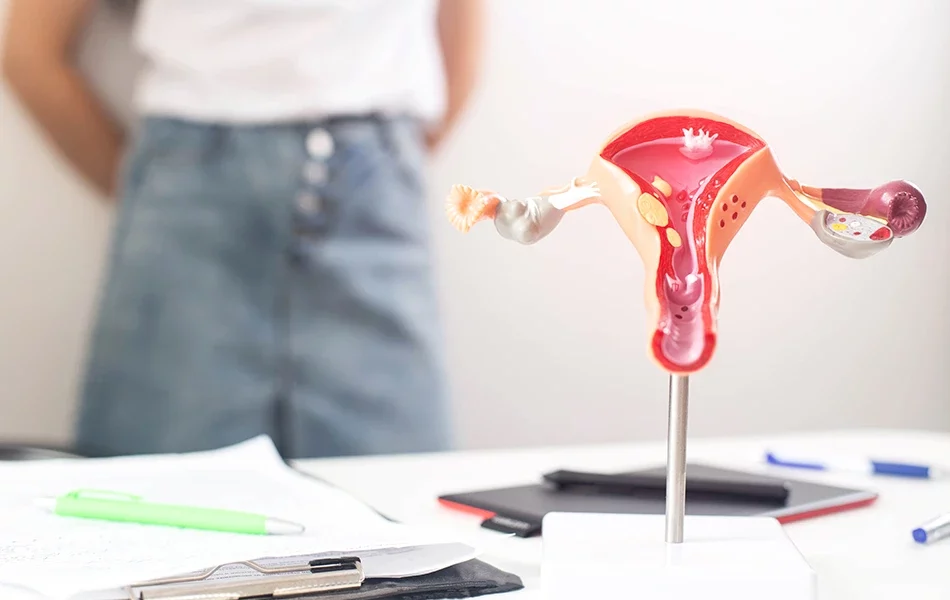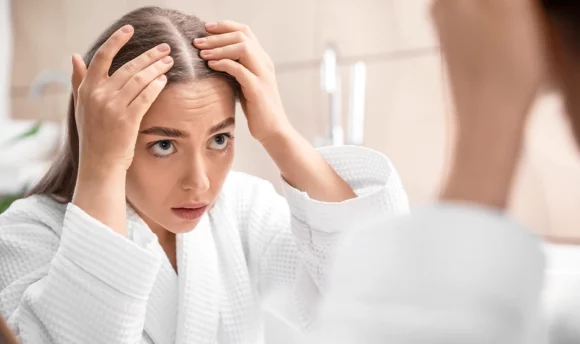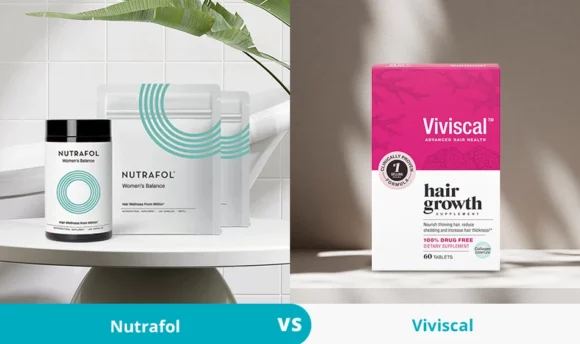Dealing With PCOS Hair Loss: Symptoms, Causes, and Treatment
Women struggling with PCOS often experience hair loss issues. Can hair loss be caused by PCOS, and how can you treat it?

Polycystic ovary syndrome (PCOS) is a common hormonal disorder in women of reproductive age that can result in hair loss.
This can be a highly distressing symptom causing many women to feel frustrated and unknowing what to do.
If you are struggling with PCOS-related hair loss or hair shedding and seeking science-backed explanations and treatment methods, this article is for you.
Keep on reading to understand PCOS hair loss, its symptoms, causes, and treatment options.
PCOS Hair Loss: How Does It Affect You?
Polycystic ovary syndrome (PCOS) is a complex, hormonal imbalance-caused condition reportedly associated with multiple unpleasant symptoms: from irregular periods to weight gain and hair loss.
PCOS-related hair loss affects many women. Most of them notice their hair start falling out and becoming thinner and weaker.
Not only does this cause physical changes in appearance, but it also leads to immense emotional discomfort.
What Is PCOS?
Polycystic ovary syndrome (PCOS) is a condition that affects women of childbearing age. During PCOS, women’s ovaries overproduce androgens (male hormones; they are usually present in women in small amounts).
PCOS, a condition that affects 6–12% of women of reproductive age, is one of the main female infertility reasons.
Currently, the exact cause of PCOS is not fully understood. Yet, it is believed to involve a combination of genetic and environmental factors. PCOS usually runs in families and is linked to insulin resistance.
The higher level of male hormones in the woman’s body stops the egg from being released (during ovulation). This causes a wide range of PCOS symptoms, including:
- Irregular menstrual cycles
- Acne
- Weight gain
- Infertility
- Excess body and facial hair growth
- Hair thinning
- Hair loss
Therefore, PCOS can either cause excess hair growth on the body and face or hair loss, medically referred to as female pattern baldness.
Why does it happen, and is there anything you can do to stop it?
Why Does PCOS Cause Hair Loss?
Hair loss is one of the most common symptoms of PCOS. It typically occurs on the scalp and can be gradual or sudden. Women with PCOS may also experience thinning hair, bald patches, or excessive shedding.
The hormones are the primary reason behind PCOS-related hair loss. PCOS is associated with higher-than-usual levels of testosterone. This, in turn, stimulates hair growth and is referred to as androgenic alopecia.
PCOS hair loss is different from male-pattern baldness, distinguished by a receding hairline, balding, and thinning on the crown of the head. Women, on the other hand, notice thinning hair around their temples and frontal regions of their scalps.
Therefore, for you to experience PCOS-related hair loss, you must have pretty high levels of androgen.
Is PCOS hair loss reversible?
Luckily, the hair loss caused by PCOS (polycystic ovary syndrome) can be reversible with appropriate treatment and management of the underlying hormonal imbalances. It depends on the severity and duration of your hair loss and your body’s response to the treatment.
For that, you first need to treat the underlying cause – polycystic ovary syndrome and hormonal imbalance.
This may involve medical interventions such as hormonal therapy (like oral contraceptives or antiandrogen medications), which can help regulate hormone levels and reduce the effects of androgens on the follicles.
In addition to medical interventions, lifestyle changes such as maintaining a healthy diet, regular exercise, avoiding harsh haircare products, and practicing scalp care can also contribute to reversing PCOS-related hair loss and regrowing thinning hair.
How to Treat PCOS-Caused Hair Loss: 7 Remedies to Try Now
Although PCOS-related hair loss can be frustrating and difficult to deal with (physically and emotionally), there are treatments available that can help, including medication, lifestyle changes, and hair restoration techniques.
#1 Oral contraceptive
Birth control pills are one of the most commonly prescribed medications for women with polycystic ovarian syndrome, helping them manage PCOS symptoms.
These medications often contain a combination of estrogen and progestin, which can help reduce the production of androgens that can contribute to hair loss.
Besides, oral contraceptive pills can also help regulate menstrual cycles, which can be irregular in women with PCOS.
#2 Antiandrogens
Antiandrogens are medications that can help block the impact of androgens on hair follicles. The antiandrogenic properties may help reduce the effects of high androgens (hormones that can contribute to hair loss in PCOS).
These medications are often prescribed in combination with oral contraceptives to help manage PCOS-related hair loss.
Spironolactone is a commonly prescribed antiandrogen that can help reduce the action of androgens in the hair follicles. When used as prescribed, it promotes women’s hair regrowth and reduces hair loss.
#3 Minoxidil
Minoxidil is an FDA-approved topical medication that can promote hair growth. It is often used to treat male pattern baldness or male pattern hair loss. It can also be effective in women with female pattern hair loss.
It is available over the counter and can be applied directly to the scalp. Minoxidil works by increasing blood flow to the follicles and promoting hair growth.
Although it may take several months to see results from Minoxidil, this is an effective medication for treating female pattern baldness. Some studies have also found that Minoxidil treatment worked even better when it was combined with spironolactone, another medication for hair loss.
#4 Weight loss
PCOS is often associated with weight gain and obesity, which can further exacerbate hormonal imbalances and hair loss.
If you are diagnosed with PCOS and are overweight, lifestyle changes can alleviate your symptoms. Losing weight, exercising regularly, and eating a balanced and wholesome diet are associated with improved symptoms of PCOS.
Losing as little as 5% of your body weight can improve insulin resistance, regulate hormone levels, and reduce the production of androgens. This can help improve hair growth and reverse PCOS-caused hair loss.
Consider incorporating regular physical activity such as cardio exercises, strength training, or yoga into your routine, along with a balanced diet that is rich in nutrients and low in processed foods and added sugars.
#5 Natural remedies
Several natural remedies may help manage hair loss caused by PCOS. Some studies have shown that supplements such as saw palmetto, zinc, and biotin may help reduce hair loss and promote regrowth in women with PCOS.
Although the vitamins are usually safe to consume, it is important to consult your healthcare provider before taking any supplements to ensure they are effective for your specific condition.
Enrich your diet with leafy greens, eggs, nuts, seeds, fatty fish, and whole grains. Getting the vitamins your hair needs from your diet will help you to support hair health from within.
Also, support overall hair health by avoiding heated styling tools and harsh chemicals that can damage your hair and worsen hair loss. Pick haircare products free from harmful chemicals like sulfates and parabens.
#6 Scalp massage
Scalp massage is associated not only with tension release but with hair growth.
Massaging the scalp with gentle circular motions for several minutes each day can help stimulate hair follicles, improve blood flow, promote healthy hair growth, and enhance hair thickness.
Allocate a few minutes daily (or at least 5 minutes each time you wash your hair) to massage your scalp. Use natural oils like coconut, castor, or rosemary for a relaxing and nourishing scalp massage.
Just apply the oil to your scalp and gently massage it for a few minutes before shampooing. You can use your fingers or a scalp massaging tool.
#7 Hair transplants
For women who have significant hair loss and other treatments have not been effective, hair transplants may be an option.
Hair transplants involve removing hair follicles from one part of the body (usually the back or sides of the scalp) and transplanting them to the balding areas with thinning or no hair.
Although this is a more invasive and costly option, it provides the permanent results of a full head of hair and dramatically boosts the self-confidence of women with PCOS.
Note: The results may vary depending on the severity of your PCOS and the individual response to treatment. It may take time and consistency in implementing the recommended treatments and lifestyle changes to see significant improvements in PCOS-related hair regrowth.
A Word From a Trichologist
PCOS-related hair loss is one of the most distressing symptoms of polycystic ovary syndrome that affects many women of childbearing age. The hormonal imbalances associated with PCOS can disrupt the natural hair growth cycle and lead to hair loss.
Yet, never forget that PCOS-related hair loss is treatable.
With a holistic approach that includes addressing the underlying hormonal imbalance, making dietary and lifestyle changes, and following a targeted haircare routine, women can effectively manage PCOS-related hair loss and restore their hair’s health.
Women with PCOS are not alone. There are many effective solutions available to help them regain their confidence and enjoy healthy, vibrant hair.
Conclusion
Affected women can experience challenging PCOS symptoms from irregular menstrual cycles, acne, and weight gain to hair loss. All these distressing symptoms are caused by hormonal imbalances in the body.
Targeting them as soon as you notice the discomfort can help you effectively manage PCOS-related hair loss and restore hair health.
There are many existing remedies that women find helpful – from changing lifestyle habits and losing weight to trying out medications or, in severe cases, hair transplants.
Don’t hesitate to seek support from healthcare professionals and trichologists and regain control of your hair health.

















































 Select your language:
Select your language: 








